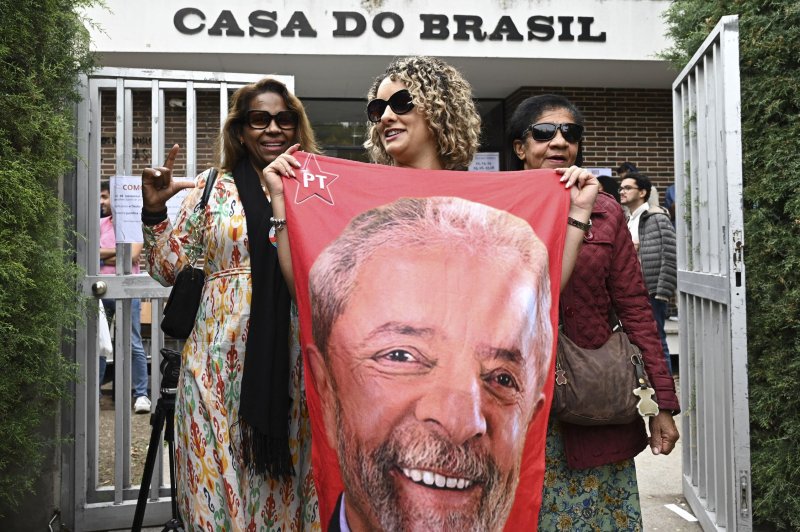Daily News
1/2

A Brazilian voter holds a banner picturing presidential candidate Lula da Silva after casting her ballot as she leaves a polling station during the second round of the Brazilian presidential election at Casa do Brasil, in Madrid, Spain, on Sunday. Photo by Fernando Villar/EPA-EFE
Oct. 30 (UPI) — All polling locations for Brazil’s presidential runoff election have closed with results expected to come in over the next few hours.
Brazil’s far-right leader Jair Bolsonaro is facing off against former President Luiz Inácio Lula da Silva, a left-wing politician who was previously imprisoned on corruption charges, the election — which is being watched closely by the United States and around the world.
Early results showed Bolsonaro leading Lula by just over a single percentage point in the neck-to-neck race, with a third of all ballots counted.
However, Lula pulled ahead as the vote continued and was leading Bolsonaro by 50.29% to 49.71% with more than 79% of votes counted.
The runoff election comes after neither candidate secured a majority during the first round of the election earlier this month, which Lula was favored to win. The latest polls from the IPEC Institute released on Saturday showed Lula winning the runoff with 54% of the vote to 46% for Bolsonaro.
The results of the election, between polar opposite candidates, are expected to have far-reaching implications including on the future of the Amazon rainforest, political stability in Latin America and international trade.
Polls opened in Brazil at 8 a.m. and run until 5 p.m. Dual citizens in the U.S. can vote at consulate offices.
“Today is possibly the most important day of October 30 of my life. And I think it is a very important day for the Brazilian people because today the people are defining the model of Brazil they want, the model of life they want,” Lula said Sunday, according to Brazilian broadcaster Globo.
Lula, a former union leader, previously led Brazil through a period of growth as president from 2003 to 2010, during which he introduced social programs to combat poverty in the country and revitalized the nation’s oil industry.
However, Brazil’s Public Ministry opened a sweeping investigation into corruption allegations in 2015 and he was convicted in January 2018 of having had accepted more than $1 million in bribes from the country’s Petrobras oil company and collaborated in a money laundering scheme.
That year, Bolsonaro rose to the presidency on campaign promises to fight corruption and develop the nation’s economy further.
Lula was sentenced to 12 years in prison and appealed. He was released in November 2019 when Brazil’s federal supreme court ruled that incarcerations with pending appeals were unlawful. His convictions were ultimately nullified last year.
Bolsonaro, a 67-year-old retired military officer, has faced widespread criticism in Brazil and abroad for his handling of the COVID-19 pandemic, his policies on deforestation in the Amazon and his attacks on the country’s electoral system — alleging he could only lose by voter fraud.
His comments on election security have raised concerns of violence and for Brazil’s democracy if he were to lose the election.
Under Bolsonaro’s presidency, deforestation in the Amazon has risen to a 15-year high and rose by 81% in August alone, according to the Climate Observatory. The country is also suffering from inflation levels higher than 8%.
The United States is paying particularly close attention to the Brazilian election and Bolsonaro has touted his friendship with former President Donald Trump, who endorsed him in the election.”
This is going to be one of the most intense and dramatic elections in the 21st Century,” former Trump aide Steve Bannon told the BBC, describing the Brazilian leader as a “great hero” for nationalist populism around the world.
Sen. Patrick Leahy, D-VT, told the BBC that “the fate of Brazil’s democracy and of U.S. relations with Brazil will be decided in the upcoming election.”
“Brazil needs a government that takes care of our people again, especially those who need it most,” Lula said in a statement Saturday.
“It needs peace, democracy and dialogue. With credibility, predictability and stability in the economy. Let’s rebuild Brazil together.”

0 Comments :
Post a Comment